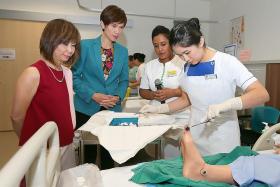Healthcare sector will provide many jobs: Amy Khor
The growing healthcare sector will provide thousands of jobs in the coming years, including many suitable for older mid-career people who might have no experience in the field, said Senior Minister of State for Health Amy Khor.
The Sengkang General and Community Hospitals opening next year, and five new polyclinics in the next three years, will need 9,000 more people - half of them professionals, managers, executives and technicians (PMETs), she said.
Dr Khor is overseeing efforts to match Singaporeans to jobs in healthcare, one of five sectors identified by the Government as being affected by disruptive technology but which also have significant potential for growth.
The other industries are infocomm and media; wholesale trade; professional services and financial services. Efforts are underway to help workers make the switch to these sectors.
In an interview with The Straits Times, Dr Khor said the Government sees the healthcare industry as part of the solution to the rise in long-term unemployment, especially for older people and PMETs.
PMETs, who represent half the workforce, have been hardest hit by the tepid job market.
They made up almost two- thirds of people unable to find a job within six months of becoming unemployed.
And the number of people facing such long-term unemployment rose by a third last year, from 12,700 in 2015 to 17,000 in 2016.
Older people, who form more than two-thirds of the unemployed, face greater difficulty in finding a job, with thousands of those in the long-term unemployed group being PMETs aged 40 and older.
Dr Khor said: "We're particularly interested in the 40-plus (age group) simply because they have a harder time making a career switch. We want to make the transition a little easier."
Fresh graduates entering the sector need not worry that mid-career people will deprive them of jobs.
"Even with improved technology and workflow processes, the overall numbers are still positive," she said.
The variety of job openings in healthcare includes therapists, care coordinators and centre managers, although the bulk will be in nursing.
Much of this growth is due to the ageing population.
Dr Khor admits that workers wanting to switch to healthcare will need a lot of training.
Nurses spend two years in the classroom and two years training on the job.
To make it less painful, the Professional Conversion Programme to help workers make a mid-career switch gives them an allowance of up to $2,420 a month, depending on the job and their work experience.
While this would be less than their last-drawn salary, it would not be fair to pay them the full salary of someone who is working full time, she said.
The course fee, which could top $40,000, is either heavily subsidised or fully funded.
On the plus side, they would get a steady job in a sunrise industry where the demand for their services will remain significant in the foreseeable future.
She said the number of people converting to nursing went up from 21 a year over the last three years, to 34 in April this year.
Aside from helping job seekers learn skills for available roles, Dr Khor said she would also work with employers on funding support.
Get The New Paper on your phone with the free TNP app. Download from the Apple App Store or Google Play Store now


